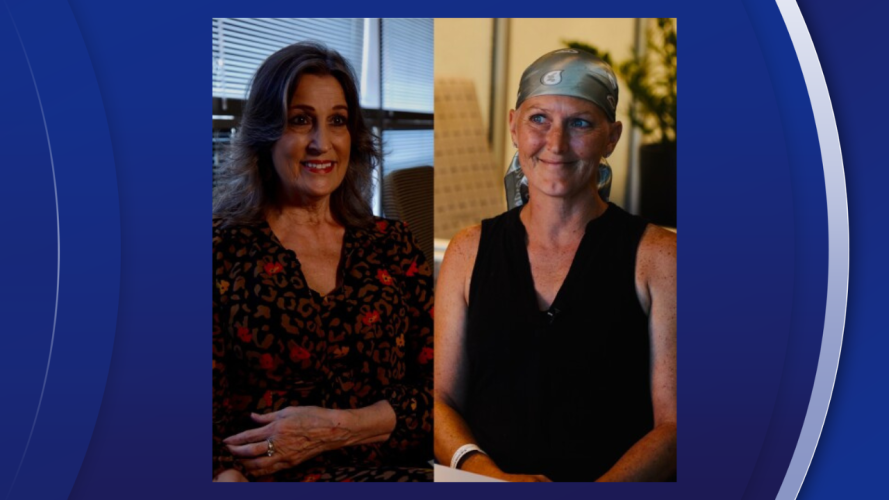TAMPA, Fla. — As we close out Breast Cancer Awareness Month, we sat down with two Tampa Bay women at opposite ends of their cancer journeys, both sharing their stories of hope, strength, and community to inspire others facing similar battles.
Katie Kochanski was diagnosed with metastatic breast cancer—stage four—this past May. The diagnosis came as a complete shock.
"A shock is the best way to describe it, like, literally, life-altering," Kochanski told Tampa Bay 28 reporter Michael Paluska.
WATCH: Tampa Bay women share stories of hope and resilience in the cancer fight
The diagnosis was shocking because Kochanski had no family history of cancer and tested negative for dozens of cancer gene mutations.
"I have zero family history of any kind of cancer. I did the genetic testing. I tested negative for all 85 cancer gene mutations," Kochanski said.
The diagnosis isn't slowing Kochanski down. She owns Double K Farm in Sebring, where she grows seasonal organic produce. Even during rounds of chemotherapy, she continued working in the fields.
"All seasonal produce, all organic. No, till the hard way —I don't own a tractor. I do everything with a wheelbarrow, a shovel, a pitchfork, a rake," Kochanski said.
When dealing with the emotional challenges of her diagnosis, Kochanski has found her own way to cope.
"I get angry. Obviously, everybody does. So I do allow myself a, you know, when I feel I need to get it out, like I go outside, I throw a pitchfork, I scream, you know, I'm in the live in the middle of nowhere, which is the great part I don't have to worry about, you know, neighbors. But you need to stay positive. You have to stay positive," Kochanski said.
Shelby Coriaty's cancer journey began 25 years ago in September 2000. When she met her first oncologist, his words were devastating.
"25 years ago, when I met my first oncologist, his first words to me were some of his first words were that 'I would not survive,'" Coriaty said.
The news was terrifying for Coriaty.
"Honestly, it was terrifying, because I wasn't obviously as educated as I am now on cancer, and especially with the role that I have as a professional," Coriaty said.
Coriaty was diagnosed with triple-negative stage three breast cancer. Three years later, she discovered she also had hereditary cancer syndrome, which meant she had a 50% chance of passing the genetic mutation to her children.
The hereditary link became tragically clear when her sister Terry was diagnosed a year after Croats.
"My sister Terry passed away, and she got diagnosed a year after me. So that's how we found out we had that hereditary link. It was when she got diagnosed, because we were just a year apart. Still, she unfortunately had cardio toxicity from the radiation therapy, and she didn't know she had heart damage, so she unfortunately had a stroke and passed away. It was very tragic," Coriaty said.
Now, Coriaty dedicates her life to supporting cancer patients as Director of Marketing and Patient Support at Comprehensive Hematology Oncology. Her personal experience allows her to connect with patients in a unique way.
"It's wonderful when I get to sit down and hold a patient's hand, when they'll come and say, Shelby, can you come talk to this patient? And I will sit and hold their hand and say, I want to tell you that I know, and I want to encourage you. I have been in this chair, you know, and you can do this," Coriaty said.
For both women, hope has been a constant theme throughout their recovery.
Coriaty recently experienced a milestone she thought she might never see—becoming a grandmother.
"To see these steps of life, you know that you thought you weren't going to get it, it's a constant reminder," Coriaty said. "Keep putting one foot in front of the other. There's light at the end of the tunnel, and you can get there."
Both women have discovered inner strength they didn't know they possessed.
"What’s been the most surprising thing you've had to learn about yourself being diagnosed stage four?" Paluska asked.
"How resilient I really am," Kochanski said when asked what she's learned about herself since her stage four diagnosis. "I'm tougher than I thought I was."
Despite the challenges, both women maintain perspective about their journeys.
"Every once in a while, I'm like, yeah, now this isn't happening to me, but then it snaps out really quick, and it's like, no, this is just, it's part of my story now, and it's not going to end this way," Kochanski said.
Both women sat down to raise awareness for the women who came before, the ones still fighting, and the women taken too soon—hoping to reach out and save as many lives as possible.
This story was reported on-air by a journalist and has been converted to this platform with the assistance of AI. Our editorial team verifies all reporting on all platforms for fairness and accuracy.
Share Your Story with Michael

A lot goes into the price of paradise and Michael Paluska focuses on every aspect. From the job market and housing to how Florida’s growth impacts our state’s wildlife. Send Michael tips to keep these important conversations going.
.

Largo family loses home in morning fire, forced to start over
Mother and her nonverbal son with autism 20 escape safely as the home is condemned; community steps in to help with housing and recovery.





